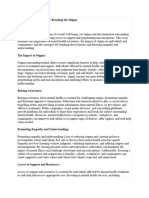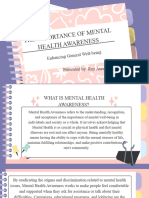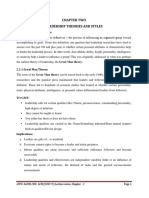1.
Introduction
Opening hook: Share a compelling story, statistic, or quote to capture attention (e.g., "1
in 5 adults in the U.S. experience mental illness each year").
Introduce the topic: Define mental health and emphasize its importance to overall well-
being.
Purpose of the speech: Explain why it’s essential to talk about mental health—reducing
stigma, promoting awareness, and offering support.
Preview main points: Briefly outline the key areas you will cover in the speech (e.g.,
understanding mental health, addressing stigma, seeking help).
2. Understanding Mental Health
Definition: Explain what mental health is (emotional, psychological, and social well-
being).
Importance: Discuss how mental health affects our thoughts, feelings, behavior,
relationships, and overall functioning.
Common mental health conditions: Briefly mention conditions like depression, anxiety,
bipolar disorder, etc.
Statistics: Share key figures to highlight the widespread impact of mental health issues
globally or locally.
3. The Stigma Surrounding Mental Health
Impact of stigma: Discuss how societal stigma leads to misunderstanding, shame, and
reluctance to seek help.
Examples of stigma: Share personal stories or examples of discrimination faced by
individuals with mental health challenges.
Breaking the stigma: Offer strategies for reducing stigma (e.g., education, empathy,
normalizing discussions).
4. The Importance of Seeking Help
Barriers to seeking help: Discuss reasons why people might avoid seeking treatment
(fear, lack of access, financial challenges).
Resources available: Highlight available support systems such as therapy, hotlines,
support groups, and community resources.
Encouragement: Emphasize that seeking help is a sign of strength and that mental health
care is just as important as physical health care.
5. Ways to Improve Mental Health
Self-care: Promote practices like mindfulness, exercise, healthy eating, and rest.
Building resilience: Discuss the importance of coping strategies and positive thinking.
Social support: Encourage building strong support networks with family, friends, and
community.
�6. Conclusion
Recap: Summarize the key points—mental health awareness, breaking stigma, seeking
help, and self-care.
Call to action: Encourage the audience to start conversations about mental health, seek
help when needed, and support others in their mental health journeys.
Closing thought: End with an uplifting or motivational message, such as: "Taking care
of your mental health is just as important as taking care of your physical health."



























































































